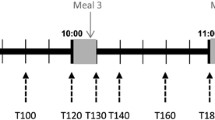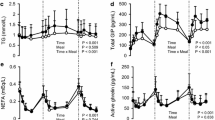Abstract
Ghrelin is the most powerful orexigenic hormone in mammalian physiology. Ghrelin plasma concentrations increase prior to meal onset, but decrease post-prandially. We and others reported previously that insulin reduces circulating ghrelin levels and might therefore be a driving force for post-prandial suppression of ghrelin. To test the influence of insulin on post-prandial ghrelin regulation, a patient with Type 1 diabetes with complete insulin deficiency received a low glycemic index meal and subsequently an additional high glycemic index meal in the absence of insulin substitution. Subsequently, a sc injection of 0.08 IU Lispro insulin per kg body weight was given. Results were compared to those of a healthy control subject matched for sex, age and body mass index, which was undergoing the same test series (without Lispro bolus) in the presence of endogenous post-prandial insulin secretion. A substantial decrease of plasma ghrelin levels was observed in the insulin-deficient patient following low glycemic index carbohydrate load (27% plasma ghrelin decrease). The subsequent exposure to a high glycemic index meal resulted in a slight additional reduction of ghrelin levels (32% from baseline), while Lispro bolus did not induce further changes in circulating ghrelin (27% of baseline at termination). This post-prandial response was comparable to that of the healthy control subject (33% reduction after the first meal, 40% after the second meal). These data tentatively suggest that post-prandial secretion of ghrelin is not exclusively regulated by plasma insulin or plasma glucose but may depend on other metabolic factors yet to be identified.
Similar content being viewed by others
References
Kojima M, Hosoda H, Date Y, Nakazato M, Matsuo H, Kangawa K. Ghrelin is a growth-hormone-releasing acylated peptide from stomach. Nature 1999, 402: 656–60.
Date Y, Kojima M, Hosoda H, et al. Ghrelin, a novel growth hormone-releasing acylated peptide, is synthesized in a distinct endocrine cell type in the gastrointestinal tracts of rats and humans. Endocrinology 2000, 141: 4255–61.
Wren AM, Small CJ, Abbott CR, et al. Ghrelin causes hyperphagia and obesity in rats. Diabetes 2001, 50: 2540–7.
Tschop M, Smiley DL, Heiman ML. Ghrelin induces adiposity in rodents. Nature 2000, 407: 908–13.
WrenAMSealLJCohenMAetal.Ghrelinenhancesappetiteandincreasesfoodintakeinhu ans.JClinEndocrilMetab2001 86 5992
Horvath TL, Diano S, Sotonyi P, Heiman M, Tschop M. Minireview: ghrelin and the regulation of energy balance — a hypothalamic perspective. Endocrinology 2001, 142: 4163–9.
Tschop M, Wawarta R, Riepl RL, et al. Post-prandial decrease of circulating human ghrelin levels. J Endocrinol Invest 2001, 24: RC19–21.
Cummings DE, Purnell JQ, Frayo RS, Schmidova K, Wisse BE, Weigle DS. A preprandial rise in plasma ghrelin levels suggests a role in meal initiation in humans. Diabetes 2001, 50: 1714–9.
Barkan AL, Dimaraki EV, Jessup SK, Symons KV, Ermolenko M, Jaffe CA. Ghrelin secretion in humans is sexually dimorphic, suppressed by somatostatin, and not affected by the ambient growth hormone levels. J Clin Endocrinol Metab 2003, 88: 2180–4.
McCowen KC, Maykel JA, Bistrian BR, Ling PR. Circulating ghrelin concentrations are lowered by intravenous glucose or hyperinsulinemic euglycemic conditions in rodents. J Endocrinol 2002, 175: R7–11.
Mohlig M, Spranger J, Otto B, Ristow M, Tschop M, Pfeiffer AF. Euglycemic hyperinsulinemia, but not lipid infusion, decreases circulating ghrelin levels in humans. J Endocrinol Invest 2002, 25: RC36–8.
Saad MF, Bernaba B, Hwu CM, et al. Insulin regulates plasma ghrelin concentration. J Clin Endocrinol Metab 2002, 87: 3997–4000.
Flanagan DE, Evans ML, Monsod TP, et al. The influence of insulin on circulating ghrelin. Am J Physiol Endocrinol Metab 2003, 284: E313–6.
Lucidi P, Murdolo G, Di Loreto C, et al. Ghrelin is not necessary for adequate hormonal counterregulation of insulin-induced hypoglycemia. Diabetes 2002, 51: 2911–4.
Schaller G, Schmidt A, Pleiner J, Woloszczuk W, Wolzt M, Luger A. Plasma ghrelin concentrations are not regulated by glucose or insulin: a double-blind, placebo-controlled crossover clamp study. Diabetes 2003, 52: 16–20.
Caixas A, Bashore C, Nash W, Pi-Sunyer F, Laferrere B. Insulin, unlike food intake, does not suppress ghrelin in human subjects. J Clin Endocrinol Metab 2002, 87: 1902.
Report of the Expert Committee on the Diagnosis and Classification of Diabetes Mellitus. Diabetes Care 2002, 25: S5–S20.
Cowley MA, Smith RG, Diano S, et al. The distribution and mechanism of action of ghrelin in the CNS demonstrate a novel hypothalamic circuit regulating energy homeostasis. Neuron 2003, 37: 649–61.
Masaoka T, Suzuki H, Hosoda H, et al. Enhanced plasma ghrelin levels in rats with streptozotocin-induced diabetes. FEBS Lett 2003, 541: 64–8.
Author information
Authors and Affiliations
Corresponding author
Rights and permissions
About this article
Cite this article
Spranger, J., Ristow, M., Otto, B. et al. Post-prandial decrease of human plasma ghrelin in the absence of insulin. J Endocrinol Invest 26, RC19–RC22 (2003). https://doi.org/10.1007/BF03347349
Accepted:
Published:
Issue Date:
DOI: https://doi.org/10.1007/BF03347349




